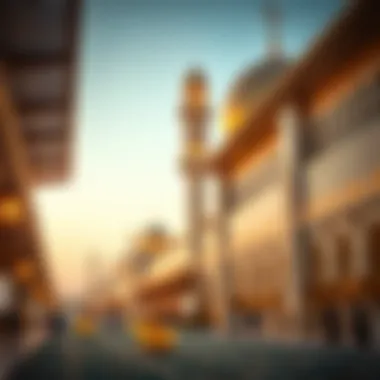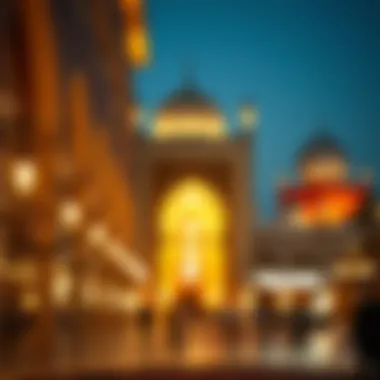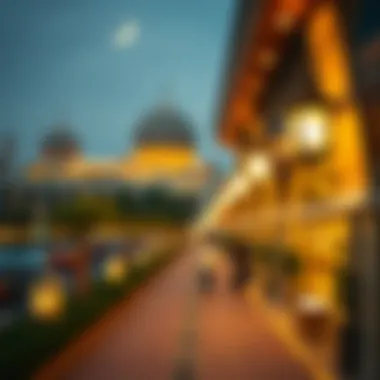Ramadan 2024: Cultural Insights in Abu Dhabi


Intro
Ramadan in Abu Dhabi is much more than a religious observance; it's a vibrant tapestry woven into the fabric of the city’s culture. Each year, this holy month brings a shift in daily life, showcasing the spirit of unity and communal respect. Residents and visitors alike find themselves immersed in a series of rituals, communal prayers, and shared meals that reflect the essence of generosity inherent in the local culture.
As we approach Ramadan 2024, this overview will take a closer look at how the holy month influences various aspects of life in Abu Dhabi. From cultural practices and community events to market dynamics, the impact of Ramadan is felt across both social and economic spheres. This context is essential for residents, potential investors, and stakeholders intrigued by the opportunities that arise during this time.
Expect to delve into market insights that will shed light on the current property trends and investment opportunities influenced by Ramadan. You will also find practical guidance tailored for those looking to navigate buying or renting properties during this period.
As we explore this unique moment in Abu Dhabi’s calendar, we aim to provide an enriching understanding of how Ramadan shapes life in the city while offering strategic information for various audiences involved in the real estate sector.
Understanding Ramadan
Ramadan holds a profound significance not just within the realms of spirituality but also in the fabric of daily life in Abu Dhabi. As a month where millions of Muslims fast from dawn to sunset, its implications extend beyond personal reflection and worship. In this article, the exploration of Ramadan 2024 provides a perspective on how this holy month influences various aspects of society, from economic shifts to cultural practices.
Historical Context
The roots of Ramadan trace back to the 7th century, tied to the revelations received by the Prophet Muhammad. This month is not merely an annual event on the calendar; it marks a significant spiritual journey observed through fasting, prayer, and introspection. The tradition of Ramadan as it is known today has evolved, shaping a cycle of observance and community that has persisted for centuries.
In Abu Dhabi, the historical significance can be seen in the preservation of traditions like Tarawih prayers, conducted nightly, and the practice of communal breaking of the fast known as Iftar. These moments are steeped in history, linking the present practices with their deep historical roots. This connection helps to cultivate a deeper understanding of communal values and the essence of sacrifice and empathy.
Cultural Significance
Culturally, Ramadan reflects a mosaic of practices that blend religious observances with local customs. The month is a time for families and communities to gather, to share meals, and to foster bonds that may have dulled over busy schedules. In Abu Dhabi, the fast is seen as a purifying trial, molding individuals’ character and reinforcing the spirit of giving and hospitality.
Food plays a pivotal role during Ramadan, with dishes taking center stage at Iftar. Traditional meals such as dates, hummus, and sambusa become more than just sustenance; they symbolize warmth, community, and the joy of reunion. Streets and homes are adorned not only with decorations but also with a sense of anticipation for the gatherings that will transform everyday routines into festive celebrations.
In essence, understanding Ramadan goes beyond religious observance. It interweaves with local identity, societal behaviors, and the economy, making it vital to comprehend this month in Abu Dhabi fully. As this article explores the myriad aspects of Ramadan 2024, it sheds light on its significant impact not only on individual lives but also on the very structure of communal relations and economic flows in this dynamic city.
"Ramadan teaches us the importance of patience, empathy, and communal bonds, making it a cornerstone of societal harmony and cultural richness in Abu Dhabi."
Ramadan Dates and Timeline
Understanding the specific dates and timeline of Ramadan 2024 is crucial for both residents and potential investors in Abu Dhabi. Ramadan is not just a month of fasting; it’s an experience that influences many aspects of daily life—from work hours to family gatherings, and even real estate dynamics. Knowing the exact dates helps people plan their lives accordingly, from adjusting work schedules to preparing for cultural festivities. Ramadan 2024 is expected to commence on the evening of Sunday, March 10, and last until the evening of Tuesday, April 9, 2024, although these dates may shift slightly based on moon sightings.
Calendar of Ramadan
During Ramadan, the Islamic lunar calendar dates are observed, which can lead to some discrepancies with the Gregorian calendar. The importance of tracking the Ramadan calendar lies not only in the spiritual aspect but also in its practical implications. Businesses often adjust their opening times; therefore, keeping an eye on the calendar can mitigate disruptions.
Here’s a snapshot of significant dates during Ramadan 2024:
- March 10: Ramadan begins (sighting of the new moon)
- March 20: Laylat al-Miraj (Night of Ascension)
- March 22: The first Friday of Ramadan
- April 4: Laylat al-Qadr (Night of Decree)
- April 9: Ramadan ends with Eid al-Fitr celebrations
For locals and visitors, observing these dates is a way to deepen cultural appreciation and partake in community practices.
Day-to-Day Observances
The daily rhythm during Ramadan diverges significantly from typical months. Daylight hours are punctuated by fasting, prayer, and community engagements, while evenings become bustling social occasions.
Here’s how the day tends to unfold:
- Suhoor: The pre-dawn meal is crucial for those fasting. Many families wake up early, gathering for a hearty meal before the day's fast begins. Traditional dishes like foul medames or dates are common.
- Fasting Hours: From dawn until sunset, abstaining from food and water serves not just as a religious duty but as an opportunity for self-discipline and reflection.
- Iftar: As the sun sets, the fast is broken. Families come together to enjoy Iftar, often starting with dates and water, then moving on to a spread of rich dishes.
- Evening Prayers: The Taraweeh prayers, held at mosques, deepen the spiritual experience. These prayers allow for reflection and community bonding after a day's fast.
- Community Activities: Many will volunteer or participate in community events, fostering unity and compassion.
"Ramadan is not merely about abstaining from food, but also about nurturing one’s spirit and forging bonds with family and the community."
Knowing what to expect each day helps residents and newcomers alike navigate the special atmosphere that envelopes Abu Dhabi during this holy month. It allows for thoughtful participation in cultural observances, linking food, faith, and fellowship in meaningful ways.
In summary, the timeline and observances during Ramadan 2024 in Abu Dhabi are pivotal for understanding how this holy month shapes the lifestyle and environment of the city. This backdrop frames every interaction and transaction, making awareness of specific dates not a mere formality, but a vital part of living and thriving through this unique time.
Abu Dhabi's Culinary Scene During Ramadan
Abu Dhabi's culinary scene takes on a vibrant hue during Ramadan, reflecting a blend of tradition and contemporary dining experiences. This holy month fosters a unique atmosphere where food is not just sustenance but a shared experience, highlighting the importance of community and family ties. As the sun sets, the city comes alive with scents of spices and stories of heritage. This section aims to illuminate how dining in Abu Dhabi during Ramadan is deeply entwined with cultural practices and social interactions, making it a focal point of the month.


Traditional Iftar and Suhoor
Popular Dishes
When it comes to Popular Dishes during Ramadan, one cannot overlook the staple of dates and water, often the first sustenance after a long day of fasting. Yet, the variety does not stop there. Luqaimat, these fragrant, syrup-soaked dumplings, offer a delightful contrast to savory dishes. Additionally, Harees, a hearty mix of wheat and meat, embodies the spirit of Ramadan with its rich, wholesome flavor.
These dishes represent more than just culinary choices; they encapsulate the traditions and stories passed down through generations. The key characteristic of these popular dishes lies in their communal nature, typically served in large platters, inviting families and friends to gather. This makes them not only beneficial in fueling the body after a day of fasting but also in nurturing relationships within the community.
However, one must note that these delicacies can sometimes be heavy, which could be a concern for those with dietary restrictions. But overall, the joy of sharing these dishes makes them a celebrated choice for Iftar.
Cooking Traditions
Cooking Traditions during Ramadan are a study in love and labor. From early morning until the sun sets, the aroma of spices fills kitchens across Abu Dhabi. A key aspect of these traditions is the preparation of meals that are often shared with neighbors and extended family. There is a sense of responsibility to uphold these culinary rites, which contribute to the communal spirit of the month.
These cooking styles often utilize low and slow methods, ensuring that flavors meld beautifully over time, resulting in dishes such as Mandi and Kabsa—both rich rice dishes that are staples during Ramadan. This slower pace allows time for reflection and connection to one’s roots as families gather in the kitchen, chatting amid chopping vegetables or stirring stews.
A unique feature of these culinary traditions is the integration of community-focused meals, like potluck Iftars, where each guest brings a dish, enriching the dining experience. While this fosters community engagement, it also exposes diners to an array of flavors and textures from different culinary backgrounds found throughout the nation.
Dining Establishments Offering Special Menus
During Ramadan, many restaurants in Abu Dhabi go above and beyond by offering special Iftar menus tailored to the season. These menus often feature traditional dishes reimagined with a modern flair, catering to both local and international palates. Dining establishments such as Emirates Palace and Al Fanar Restaurant create an unforgettable experience with beautifully set buffets, filled with both Arabic and international cuisines.
Many of these places provide a serene ambiance, an essential element for peaceful dining after a day of fasting. Additionally, some places even offer tailored dining experiences—like private tents or outdoor dining options that allow families to enjoy their meal comfortably while soaking in the evening breeze.
Furthermore, supporting local eateries during this time not only boosts the culinary economy but helps to keep the spirit of Ramadan alive through the shared love of food. This is particularly important for residents and tourists alike, who can immerse themselves in the local culture while enjoying the seasonal highlights.
"Breaking bread during Ramadan in Abu Dhabi transforms mere dining into a heartfelt celebration of community, unity, and heritage."
Overall, dining in Abu Dhabi during Ramadan is a rich tapestry woven with tradition, flavors, and fellowship, making the culinary scene an essential aspect of the holy month.
Cultural Events and Activities
Cultural events and activities during Ramadan play a crucial role in uniting communities, not just in Abu Dhabi but across the globe. This holy month fosters a spirit of togetherness and reflection that transcends age, nationality, and background. The activities, from iftar gatherings to public prayers, serve to reinforce bonds among residents and offer insights into the rich tapestry of traditions upheld during this sacred period.
The significance of participating in cultural events during Ramadan cannot be overstated. These events are not merely about social gatherings; they embody concepts of charity, community, and faith. Ultimately, they bring a sense of belonging and allow individuals to share in the collective experience of Ramadan.
Community Gatherings and Prayers
During Ramadan, community gatherings are prevalent and vary greatly in scale and purpose. Local mosques and community centers often serve as hubs where people come together for prayers and communal meals.
Key Highlights:
- Iftar Gatherings: As the sun sets, the call to prayer resonates throughout the city, signaling the time for iftar—the meal to break the fast. Families, friends, and even strangers are welcome to join in. Many establishments set up large tents or distribute meals for those who may not have a place to eat.
- Taraweeh Prayers: After the evening prayer, many mosques hold Taraweeh prayers, where long recitations of the Quran are made. This ritual not only serves as spiritual nourishment but also brings the community together in worship and reflection.
- Charity Drives: Special initiatives, like food donation drives, are organized, allowing participants to contribute to the less fortunate. Many Emiratis and residents engage in acts of kindness, reflecting the essence of Ramadan.
In essence, these gatherings transform the experience of Ramadan from a personal journey into a community-wide celebration.
Festivals and Celebrations
The festive spirit of Ramadan extends beyond prayers and meals. Various cultural celebrations are often held, marking both the beginning and culmination of the month.
- Cultural Festivals: Abu Dhabi often hosts events showcasing local artisans, traditional music, and dance. These festivals welcome both residents and tourists, showcasing Emirati heritage and providing entertainment while fostering mutual respect and understanding among diverse communities.
- Eid al-Fitr Celebrations: At the end of Ramadan, the festivities reach a crescendo with Eid al-Fitr. Markets bustle as families prepare for Eid by buying new clothes and gifts. The atmosphere is one of joy and gratitude. Special prayers are held, and large feasts are enjoyed with family and friends.
"Ramadan is about empathy, understanding, and sharing. Festivals during this time underline the importance of community and togetherness."
Impact on Real Estate Market
The real estate market in Abu Dhabi experiences distinctive shifts during Ramadan, reflecting the holy month’s intricate interplay with cultural practices and community dynamics. This section sheds light on how the observance of Ramadan alters not only the market trends but also the lifestyle preferences of both residents and investors. Knowing these specifics allows prospective buyers and renters to navigate the market intelligently.
Real Estate Trends During Ramadan
During Ramadan, the real estate landscape in Abu Dhabi shows notable characteristics influenced by the spirit of community and the nature of the holy month.


- Increased Rental Listings: With many expatriates returning to their home countries for the month, the supply of available rentals often increases. Landlords become adaptable to market fluctuations, and this can sometimes mean more negotiations on lease terms.
- Demand for Family-Oriented Properties: As families prioritize togetherness during Ramadan, larger and more family-friendly homes become highly sought after. Communities that offer convenience to mosques and communal gathering spaces see a spike in interest.
- Focus on Amenities: Properties that host amenities like fitness centers or shared spaces for community events attract attention during this time. More people are looking to live in homes where they can engage with their neighbors and enjoy social gatherings, especially post-Iftar.
Ramadan can also affect the timing of property sales. Owners might hold off on putting their units on the market, preferring to wait until the month concludes to maximize visibility and interest. This cyclical nature means that savvy investors should closely monitor shifts in listing behaviors and resident preferences during this sacred time.
Effects on Rental Demand
With Ramadan’s arrival, one might expect a dip in rental demand due to expatriates traveling home, but the reality paints a different picture. While some rentals might decrease in visibility, a concurrent rise occurs in specific segments of the rental market.
- Short-Term Rentals Appeal: Many property owners pivot to short-term rentals catering to travelers or families returning for the month. Platforms like Airbnb resonate with those looking for a welcoming space during their visits.
- Increased Demand for Iftar Venues: Properties that can serve as venues for communal Iftar dinners become popular. These might not just include homes but also larger apartments or community spaces that facilitate larger gatherings.
- Cultural Influence: The cultural significance of Ramadan often shifts the focus in housing preferences. Many renters exhibit a tendency towards properties close to mosques to enhance their spiritual experiences and community involvement during the month.
"Understanding the emotional and cultural nuances of Ramadan helps real estate stakeholders make informed decisions that align with community needs."
In summary, while Ramadan brings apparent changes to the Abu Dhabi real estate market, a complex relationship exists between community, culture, and housing demands. By staying attuned to these dynamics, investors and residents alike can adeptly position themselves in this evolving landscape.
For further insight, consider these resources:
Tourism and Ramadan
The relationship between tourism and Ramadan in Abu Dhabi is both complex and enriching. This special time of reflection and spiritual growth attracts visitors from around the globe, presenting a unique blend of cultural immersion and economic opportunities. For investors, homeowners, and anyone involved in the real estate sector, understanding this dynamic can be beneficial. Not only does it offer insights into potential market shifts, but it also highlights the growing interest in cultural tourism during religious periods.
During Ramadan, Abu Dhabi sees a noticeable uptick in visitors looking for authentic experiences. This surge of tourists is not just limited to religious pilgrims; many come to participate in community events and enjoy the vibrant culinary culture that flourishes throughout the month. For example, the Iftar meals served at various local venues can draw in a diverse crowd, eager to partake in traditional dishes like muttabaq or harees.
"Tourism during Ramadan isn't just about the sights; it's about the cultural connection that enriches every experience."
Visitor Trends During Ramadan
The trends observed during Ramadan indicate a shift in visitor demographics and behaviors. Travelers usually plan their trips around the evening hours, as they’re eager to partake in the communal breaking of the fast, or Iftar. This means a significant increase in activity after sunset, as restaurants and marketplaces come alive. Not only do these events offer a taste of local traditions, but they also enable visitors to engage with residents, fostering an environment of cultural exchange.
Moreover, families tend to be less likely to book trips during the day over Ramadan, as many locals practice fasting, which influences the overall visitor experience. Thus, leveraging social media platforms like Facebook and Instagram to share Iftar experiences can attract those interested in joining festive gatherings, providing a chance for cultural insight rarely available during standard tourist seasons.
Promotional Campaigns for Tourists
Promotional campaigns targeting tourists during Ramadan are nuanced and require careful planning. The campaign strategies focus on highlighting the unique experiences Abu Dhabi offers during this sacred month, including discounted deals on hotels and travel packages. Operators in the tourism sector introduce initiatives that cater to both local residents and international visitors, often promoting potential experiences in a "Ramadan Nights" format.
- Special Offers: Hotels may provide unique Iftar and Suhoor packages at restaurants, allowing guests to enjoy special menus against the backdrop of stunning views.
- Cultural Packages: Many travel agencies create packages that include cultural tours, visits to mosques, and community events that showcase local traditions.
- Social Media Campaigns: Engaging visual content showcasing previous Ramadan events can spark interest. Utilizing platforms like Reddit or travel blogs can effectively share success stories and promote events and offers.
In summary, as the holy month approaches, the synergy between tourism and Ramadan presents opportunities for growth and cultural exchange. Investors and real estate agents can capitalize on these trends, recognizing the importance of tailoring offerings to align with the evolving needs and interests of travelers. The collective spirit of community during Ramadan is truly an invitation to immerse oneself in the rich tapestry of Abu Dhabi’s heritage.
Ramadan and Community Engagement
Ramadan, a month of spiritual reflection, brings not only a personal sense of devotion but also fosters an environment rich in community engagement. In Abu Dhabi, as the sun sets and families break their fast, the spirit of togetherness reverberates through the air. This period becomes a platform for promoting kindness, charity, and social unity among residents, making community engagement a cornerstone of Ramadan festivities.
In Abu Dhabi, this engagement isn't just a matter of performing good deeds for their own sake; it strengthens the social fabric and generates a sense of collective responsibility. The benefits of community involvement during Ramadan span from the enhancement of local identity to the real-time improvement of living standards. By coming together through various initiatives, communities can address pressing social issues, foster relationships across different cultural backgrounds, and elevate the general happiness of their members.
Volunteering and Charity Efforts
During Ramadan, volunteering and charitable actions reach their peak in Abu Dhabi. Organizations, both religious and secular, gear up for a flourishing season of giving. Many residents take part in activities ranging from organizing food drives to providing financial assistance to those in need. This is not merely about almsgiving but about building a more resilient society.
For example, several local charities coordinate food distribution programs that deliver meals to the underprivileged, often collaborating with local restaurants that donate surplus meals for Iftar. Such endeavors do more than feed the hungry; they foster a sense of solidarity within the community.
"During Ramadan, the act of giving becomes more than just a duty; it becomes a way of uniting the community in a purpose greater than themselves."
Moreover, schools and universities encourage students to participate in volunteer programs, creating an emerging culture of empathy and social awareness among younger generations. By sponsoring events for learning about community service, educational institutions play a crucial role in facilitating this urgent aspect of Ramadan.
Interfaith Initiatives
In Abu Dhabi, interfaith initiatives gained significant momentum during Ramadan, emphasizing harmony among diverse religious groups. The holy month provides a unique opportunity to break down barriers and present an inviting space for discussions and collaborations between faiths. This is increasingly relevant given the multicultural backdrop of the UAE.
Many faith-based organizations hold interfaith dialogues, inviting people from various backgrounds to share their traditions and experiences during Ramadan. These gatherings may include shared meals or panel discussions aimed at fostering understanding and cooperation among different communities. Such interactions elevate the dialogue between Christians, Jews, Hindus, and Muslims, exemplifying not just tolerance but active engagement in mutual respect.


The Abu Dhabi Government also supports various programs that aim to strengthen ties between residents of various faiths. Some notable events include cultural open houses and community service days, which allow individuals to work side by side for a common goal regardless of their religious backgrounds. These initiatives play a pivotal role in fostering social cohesion in a rapidly evolving metropolis.
In summary, Ramadan serves as a launching pad for community engagement through volunteering efforts and interfaith initiatives. By promoting a culture rooted in compassion and understanding, Abu Dhabi emerges not only as a city deeply rooted in traditions but also as a vibrant hub where diversity is celebrated, and people come together in pursuit of a more enriching communal life.
Navigating Daily Life During Ramadan
Navigating daily life during Ramadan presents a unique blend of spiritual, cultural, and practical adjustments that impact various aspects of life in Abu Dhabi. For the local population and visitors alike, understanding these modifications is vital to ensuring a respectful and enriching experience during this sacred month. Ramadan is more than just fasting; it's an opportunity for community bonding and personal reflection. Thus, recognizing how daily routines shift can help individuals align more harmoniously with the customs and sentiments that characterize this time.
Workplace Adjustments
During Ramadan, workplaces in Abu Dhabi typically undergo noticeable changes to accommodate the needs of fasting employees.
- Shortened Working Hours: Most businesses, government offices included, adjust their working hours. For instance, hours may shift from the standard 9 AM - 5 PM to something like 9 AM - 3 PM. This allows employees the time to break their fast at sunset, which is an important ritual for many.
- Flexible Schedules: Companies might offer more flexibility for those needing to manage the physical toll fasting can take on concentration and energy levels.
- Awareness and Support: Employers may implement awareness programs to educate non-Muslim staff about Ramadan, fostering a more considerate workplace environment. This support extends to providing designated spaces for prayers or private breaks.
These adjustments not only reflect a respect for religious practices but also contribute to a supportive atmosphere that can enhance productivity and morale. As employees juggle fasting, work responsibilities, and personal commitments, these considerations become essential for fostering a balanced work-life dynamic.
Public Services During Ramadan
Public services in Abu Dhabi also adapt during Ramadan, ensuring that the community's needs continue to be met while respecting the observance of the holy month.
- Altered Timings: From public transportation to municipal services, operating hours often change. Buses may run on a different schedule, while government offices can have limited access leading up to iftar.
- Healthcare Services: Hospitals and medical facilities tend to modify their staffing strategy to ensure that sufficient personnel are available to assist patients around the clock, mindful of the extra health considerations fasting can introduce.
- Community Programs: Many municipalities promote health campaigns focused on hydration and nutrition during Ramadan, especially given the extreme summer heat in Abu Dhabi.
"Ramadan nurtures a spirit of togetherness. By aligning public services with community needs, Abu Dhabi demonstrates its commitment to inclusivity and respect throughout this transformative month."
Public Understanding of Ramadan
Public understanding of Ramadan is pivotal in fostering a sense of community and respect, particularly in a diverse melting pot like Abu Dhabi. This understanding serves as a bridge between differing cultural perspectives and promotes inclusiveness throughout society. The practices and values intrinsic to Ramadan extend beyond personal observance to influence broader community interactions, giving both residents and visitors a unique insight into this holy month.
Educational Programs
Educational programs play a vital role in promoting public understanding of Ramadan. These initiatives often target schools, universities, and community centers, aiming to educate individuals about the significance of the month. Programs might cover the historical context of Ramadan, its spiritual importance, and the daily rituals that accompany it.
- Workshops for Students: Many schools introduce workshops that engage students in discussions about fasting and empathy toward others. These programs normalize conversations about different cultures and highlight the importance of community support during Ramadan.
- Webinars and Online Courses: For those unable to attend in-person sessions, webinars offer accessibility. Many community organizations and educational institutions collaborate to create online courses that demystify Ramadan practices and encourage respectful engagement with the holy month.
These programs benefit attendees by enlightening them about local customs, while also fostering respect and tolerance. Increased awareness helps to minimize misunderstandings and create a more harmonious environment.
Cultural Sensitivity Training
Cultural sensitivity training has become increasingly essential in workplaces and public services during Ramadan. Organizations are recognizing the need to equip staff with the knowledge of cultural traditions and practices associated with this month. This kind of training ensures that employees understand the significance of fasting and can navigate interactions thoughtfully.
- Understanding Fasting: Employees learn about the fasting practices, allowing them to support colleagues observing Ramadan without inadvertently causing discomfort or miscommunication.
- Adapting Work Hours: Training highlights the importance of adapting work schedules to accommodate the fasting schedules, thereby promoting a more productive and respectful workplace.
- Diverse Interactions: Such training fosters an environment where diversity is celebrated. Staff is encouraged to respect and participate (if appropriate) in community events that are part of Ramadan, fostering a sense of belonging.
"To understand is to participate in the shared values and customs of others, weaving a richer tapestry of community life."
For further reading on the cultural significance of Ramadan, consider visiting Britannica or the educational resources offered by local universities.
References for Further Reading
Understanding Ramadan is a journey of cultural appreciation and spiritual enrichment. For readers eager to gain deeper insights into Ramadan and its significance, a curated selection of resources can illuminate various aspects of the holy month in Abu Dhabi and beyond. These references serve multiple purposes, from enriching one's own practices to understanding the global perspective on Ramadan. Below, we delve into two primary categories: books and articles as well as online resources.
Books and Articles on Ramadan
Books and articles on Ramadan provide a wealth of information, combining both historical context and contemporary insights. They can bridge the knowledge gap for those unfamiliar with the practices and beliefs surrounding this holy month. A few notable titles include:
- "Ramadan: A Time for Spiritual Renewal" by Abdulaziz Almohtaseb - This book dives into the spiritual significance of Ramadan, sharing personal stories and reflections that can inspire readers to engage more deeply with their faith.
- "The Ramadan Solution: A Practical Guide for Muslins and Non-Muslims" by Said Imran - It provides a clear guide to the customs and practices observed during Ramadan, useful for both participants and those who seek to learn.
- "Understanding Ramadan: The Real Essence of Fasting" by Hana Saeed - This title explores the essence of fasting, emphasizing social justice, empathy, and self-discipline.
Reading such texts can enrich one’s comprehension of not only the rituals but also the associated values that underpin the observance of Ramadan. They offer unique narratives that may not be covered in conventional discussions available in mainstream media.
Online Resources and Websites
The digital age has brought forth an array of online resources that make exploring the theme of Ramadan more accessible. Various websites and platforms host articles, documentaries, and community forums fostering discussions on related topics. Some significant platforms include:
- Wikipedia on Ramadan - A comprehensive overview of Ramadan’s historical and cultural aspects.
- Britannica - This encyclopedia offers detailed articles discussing the significance and practices of Ramadan, showcasing its global impact.
- Muslim Aid - Their website provides information about various charity projects initiated during Ramadan, emphasizing community support and engagement.
- Reddit forums where users share personal experiences and advice on observing Ramadan, as well as tips for maintaining a healthy lifestyle during fasting.
These platforms not only provide information but also foster a sense of community through shared experiences and advice, further enhancing the understanding of Ramadan.
"Education is the passport to the future, for tomorrow belongs to those who prepare for it today." – Malcolm X
In summary, utilizing these resources can greatly enhance one’s understanding of Ramadan. Whether one seeks to engage in personal reflection or to build a more profound respect for diverse cultures, these reading materials and online resources serve as invaluable tools for exploration. Through gaining knowledge, investors and community members alike can appreciate the rich tapestry that Ramadan weaves in Abu Dhabi and beyond.















